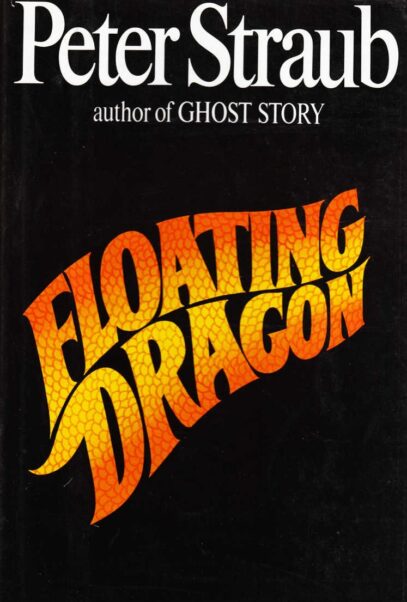 By PETER STRAUB (Putnam; 1983)
By PETER STRAUB (Putnam; 1983)
This sprawling novel was intended as a “temporary farewell” to the supernatural fare with which its author, the talented Peter Straub, had made his fortune. As Straub later wrote, “I had decided to take my leave of all this dear, goofy imagery by wrapping it all together (and) blowing it up!” Furthermore, “Anything like restraint or good taste was verboten; the aesthetic was grounded in a single principle, that of excess.” Sounds interesting—far more so, in fact, than the finished product, which is definitely excessive, but also exasperating and ultimately unsatisfying (as the late Thomas M. Disch chastised the novel in a famously withering Twilight Zone Magazine review, “Things that go bump in the night are generally scarier than things that go bump bump bump bump bump bump bump bump”).
FLOATING DRAGON is notable for containing not one but two non-human antagonists, both of them too indistinct to make a full impression: a toxic cloud that causes hallucinations and a long-dead personage who used black magic to decimate the New England community of Hampstead 100 years earlier. The “dragon” was hunted and down and killed by some townspeople, but now it seems the town is once again threatened by his undead specter, combined with the deadly effects of the cloud.
Facing down the dragon are four especially plucky townspeople: the former child actor Richard, the battered housewife Patsy, the psychically-endowed teen outcast Tabby, and Graham, an old man with inside knowledge about the forces afflicting Hampstead who narrates the story (in a voice that freely juxtaposes first and third person perspectives). None of these characters, alas, are very interesting, particularly Tabby, who registers as a grab bag of Stephen King clichés in search of a personality (the King connection, FYI, goes far deeper than it might seem).
There are some memorable things that register amid the riot of murder, hallucination, zombies, people whose skin liquefies (“leakers”) and so forth that come to increasingly dominate the narrative (there’s an especially chilling passage in which a prissy old woman dies screaming in an outdoor restaurant), but at 500-plus pages the book is vastly overlong and underplotted. Worse, Straub is guilty of self-plagiarism (if the plot sounds suspiciously like that of Straub’s vastly superior GHOST STORY that’s because it is) and impaired judgement.
Excess is fine, but passages like the climactic one in which the protagonists engage in a group recitation of “When the Red, Red Robin Comes Bob, Bob, Bobbin’ Along” to defeat the dragon are plain ridiculous (a fact not leavened at all by Straub’s claim that the sing-along was supposed to be silly), and succeed only in dragging down an already top-heavy narrative.
